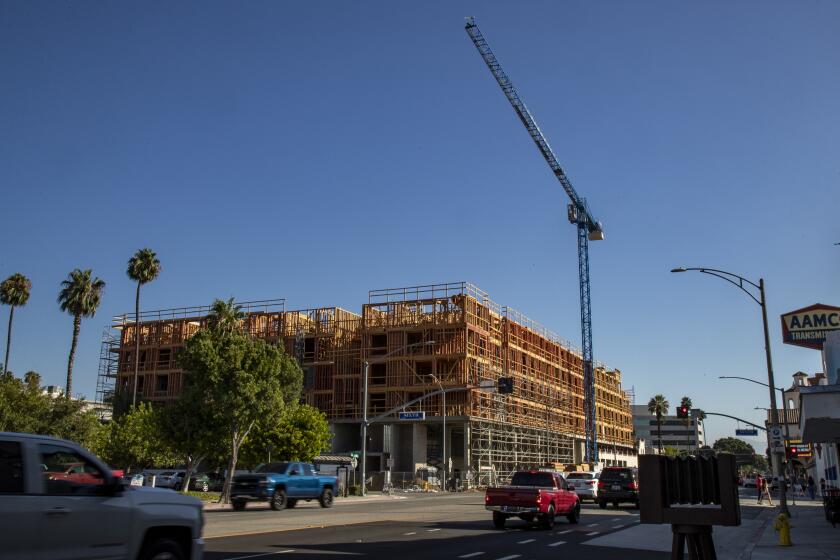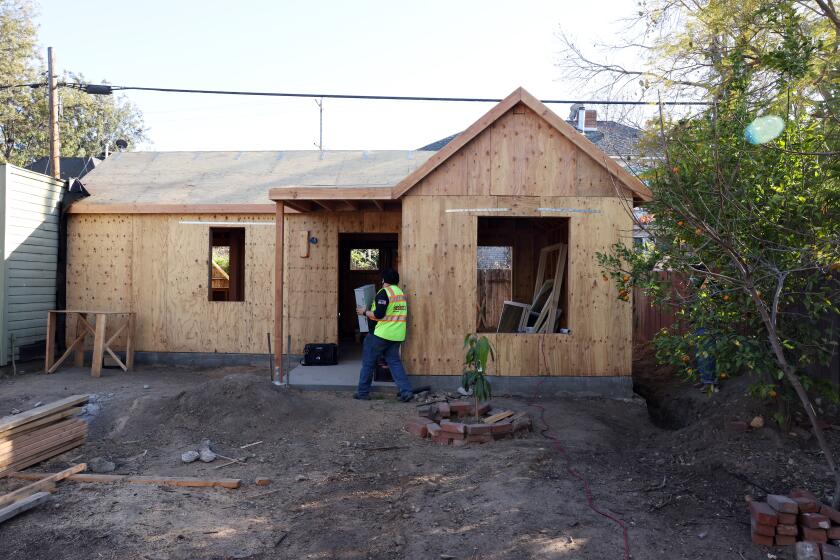Editorial: NIMBY cities, watch out. California is cracking down on housing scofflaws

NIMBY cities, watch out. California is cracking down on jurisdictions that make it too hard to build much-needed housing, and the Newsom administration’s latest target is San Francisco — the liberal city that may be the NIMBYist of them all.
Last week the state’s Housing and Community Development Department announced its first-ever “housing policy and practice review” to analyze why it’s so hard to build homes in San Francisco. The city has the longest timeline in the state for approving housing projects. From application to permit, it takes an average of 974 days for a development to get approved, according to self-reported data from the city.
That cumbersome process is one reason why San Francisco has among the highest construction and housing costs, and why state housing regulators have received more complaints about the city than any other jurisdiction in the state.
Assembly Bill 2011 would transform strip malls into housing and pay union-level wages to construction workers. Sounds like a win-win.
The review will examine why San Francisco’s approval process takes so long, which projects get approved or denied and why, and what barriers are preventing the development of low- and moderate-income housing. The analysis will be conducted by the new Housing Accountability Unit, which Newsom created last year to put teeth behind state laws aimed at boosting housing production, protecting rent-controlled units and reducing racial segregation. If the review finds that San Francisco is breaking state law, details about the violations will be sent to the state attorney general’s Housing Strike Force.
The result of all this work could be legally enforceable commitments to improve San Francisco’s processes and boost housing production, such as streamlined reviews and deadlines to approve projects. It could also create a template for development reform that other cities can follow, and an example of what might happen if they don’t.
San Francisco is an easy target because of its astronomical housing costs due to pricey real estate and city building restrictions, and the bare-knuckle fights over housing that often result in elected leaders saying “no” to new developments on flimsy grounds. In recent years, city officials have rejected a 63-unit apartment complex because it would cast an evening shadow over an adjacent park, and blocked a proposal to convert a Nordstrom valet parking lot into 500 units of new housing.
But there are plenty of cities that make it far too hard to build homes and could easily be in the crosshairs of the Housing Accountability Unit.
Two fairly modest proposals to allow greater housing density are under debate in Sacramento. They shouldn’t be controversial, and yet they are.
For decades, there have been no significant penalties for cities that flouted their obligation to plan and build enough housing to meet population demands. The state took a hands-off approach, deeming development a local control issue. As a result, too many cities were allowed to ignore their housing responsibilities and bend to slow-growth, “not in my backyard” opposition.
Now California is dealing with the consequences. The housing shortage is at the heart of the state’s biggest problems, including homelessness, poverty, income inequality, clogged freeways and pollution from long commutes. California needs to add between 1.8 million and 2.5 million homes by 2025 to ease the shortage that has driven up rents and home prices.
Yet, even now with the effects of the housing shortage glaringly obvious, some cities continue to put up barriers to housing construction, including market-rate, mixed-income and affordable projects. The obstinance is especially galling in wealthy communities, such as Atherton in the Bay Area, where residents may bemoan the lack of housing construction elsewhere or donate to charities to address the fallout from the housing shortage, but refuse to make room for more homes in their own cities.
Newsom and his housing regulators are right to crack down on housing obstructionist cities. It’s long overdue and the state cannot afford to let communities stop or slow-walk construction. San Francisco may be the target now, but other cities should be next.
More to Read
A cure for the common opinion
Get thought-provoking perspectives with our weekly newsletter.
You may occasionally receive promotional content from the Los Angeles Times.












